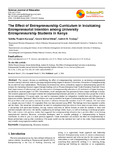| dc.contributor.author | Karanja, Tabitha W. | |
| dc.contributor.author | Ithinji, G. K. | |
| dc.contributor.author | Nyaboga, A. B. | |
| dc.date.accessioned | 2021-08-17T09:22:38Z | |
| dc.date.available | 2021-08-17T09:22:38Z | |
| dc.date.issued | 2016-04 | |
| dc.identifier.citation | Science Journal of Education 2016; 4(2): 57-64 http://www.sciencepublishinggroup.com/j/sjedu doi: 10.11648/j.sjedu.20160402.17 ISSN: 2329-0900 (Print); ISSN: 2329-0897 (Online) | en_US |
| dc.identifier.isbn | 2329-0897 | |
| dc.identifier.uri | https://www.researchgate.net/publication/346944827_The_Effect_of_Entrepreneurship_Curriculum_in_Inculcating_Entrepreneurial_Intention_among_University_Entrepreneurship_Students_in_Kenya | |
| dc.identifier.uri | http://www.sciencepublishinggroup.com/journal/paperinfo?journalid=197&doi=10.11648/j.sjedu.20160402.17 | |
| dc.identifier.uri | https://www.semanticscholar.org/paper/The-Effect-of-Entrepreneurship-Curriculum-in-among-Karanja-Ithinji/6b34253b38325c4c587b79dc2607023ca0f091b8 | |
| dc.identifier.uri | http://hdl.handle.net/123456789/4808 | |
| dc.identifier.uri | https://doi.org/10.11648/j.sjedu.20160402.17 | |
| dc.description.abstract | This research focuses on establishing the effect of entrepreneurship curriculum in inculcating entrepreneurial intention among University students pursuing entrepreneurship degree in Kenyan Universities. Promotion of entrepreneurship has existed ever since independence. The Kenyan Government has shown tremendous support to entrepreneurship growth for instance by channeling financial support through funding such as Women Enterprise fund, Youth Enterprise Fund and Uwezo fund, Improvement of infrastructure, and the introduction of entrepreneurship education in all institutions of higher learning in accordance to sessional paper 2 of 2005. Nevertheless, youth unemployment has persistently been a major challenge in Kenya. This research purposed to investigate whether the entrepreneurship education provided in Universities does propel the youth to become entrepreneurs. Chi-square model was used to determine whether the independent variable have any influence on the dependent variable. Spearman’s Rho Correlation was used to establish the degree of relationship between variables. Friedman’s five point likert scale was used to measure the extent of influence between the variables. Out of 478 students, 236 were taken as a sample size out of which 212 responded. Data was then analyzed using SPSS. The findings have been reported in tables and bar charts. The researcher recommended the need for entrepreneurship curriculum to focus more on case studies, creation of partnership with prominent business, inviting business executives to deliver lectures in order for students to learn with practical examples and access role models, emphasizing technology related topics, as well as fostering an exchange program. This study concurs with previous studies that suggested that entrepreneurship education has a positive effect in inculcating entrepreneurial intention. However, curriculum developers need to consider pedagogy of entrepreneurship in Kenyan Universities in order to give it a more practical approach. Future researchers can consider the effect of entrepreneurship in Kenya polytechnics among other institutions. Chi-square model was the statistical test used in this study, future researchers may consider using regression analysis model. | en_US |
| dc.language.iso | en | en_US |
| dc.subject | Entrepreneurship, Education, Intention | en_US |
| dc.title | The Effect of Entrepreneurship Curriculum in Inculcating Entrepreneurial Intention among University Entrepreneurship Students in Kenya | en_US |
| dc.type | Article | en_US |

